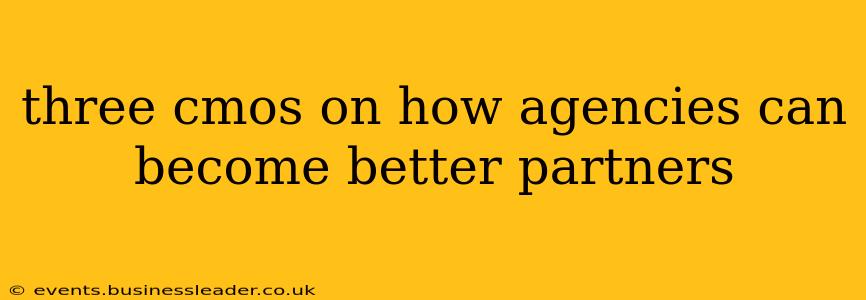Three CMOS on How Agencies Can Become Better Partners: Collaboration, Communication, and Commitment
The agency-client relationship is a delicate dance. Success hinges on a strong partnership built on mutual trust, understanding, and a shared vision. But too often, this partnership falters due to breakdowns in communication, a lack of collaborative spirit, and inconsistent commitment. Three critical components—Collaboration, Communication, and Commitment (the three Cs)—are essential for agencies to transform themselves into truly invaluable partners. This article explores each of these elements in depth, offering actionable insights for agencies striving for excellence.
Collaboration: Beyond the Brief
Effective collaboration goes far beyond simply fulfilling a client's brief. It involves a proactive approach where agencies anticipate client needs, offer strategic insights, and become an extension of the client's internal team. This requires a shift from a transactional model to a consultative one.
- Proactive Problem Solving: Don't wait for clients to identify problems; actively seek opportunities for improvement. Analyze their market position, identify emerging trends, and offer innovative solutions before they're even requested.
- Joint Strategy Sessions: Regularly scheduled brainstorming sessions involving key stakeholders from both the agency and the client foster a shared understanding of goals, challenges, and potential solutions. This collaborative approach ensures everyone is on the same page and working towards a unified outcome.
- Transparent Workflow: Maintain open lines of communication throughout the entire project lifecycle. Use project management tools that allow for real-time tracking of progress, feedback, and any potential roadblocks. Transparency builds trust and fosters a sense of shared responsibility.
- Cross-Functional Teams: Assign dedicated team members who understand the client's business and build strong relationships with key personnel. This ensures consistency, continuity, and a deeper understanding of the client's needs.
Communication: Clarity, Consistency, and Context
Clear, consistent, and contextual communication is the lifeblood of any successful partnership. It's not just about sending emails; it's about actively listening, understanding nuances, and ensuring everyone is informed and engaged.
How Often Should I Communicate with My Agency?
This depends greatly on project complexity and client needs. However, regular check-ins, whether weekly or bi-weekly, are crucial. Establish a clear communication plan upfront, specifying the frequency, methods, and key personnel involved. This structured approach ensures nothing falls through the cracks.
What Communication Channels Should We Use?
Utilize a combination of methods to suit different purposes. For instance, use email for formal updates, project management software for task tracking, and video conferencing for more in-depth discussions. Choosing the right channel enhances efficiency and minimizes misunderstandings.
How Can We Improve Internal Communication within the Agency Regarding Client Projects?
Internal agency communication is equally vital. Employ project management software, regular team meetings, and clear documentation to ensure everyone is aligned and informed. This prevents inconsistencies and ensures a unified front towards the client.
Commitment: Long-Term Vision, Not Just Short-Term Gains
Genuine commitment transcends short-term deliverables. Agencies that truly partner with their clients demonstrate a long-term commitment to their success, consistently investing in their growth and understanding their evolving needs.
- Ongoing Education and Training: Stay updated on industry best practices and invest in continuous professional development to provide clients with cutting-edge solutions.
- Long-Term Strategic Planning: Move beyond tactical campaign planning and engage in strategic discussions that map out long-term growth trajectories for the client. Become a trusted advisor who guides their overall business strategy.
- Data-Driven Insights and Reporting: Provide clients with regular performance reports that go beyond surface-level metrics, offering actionable insights and recommendations for optimization. This demonstrates a commitment to continuous improvement.
- Investing in Client Success: Agencies should view client success as their own success. Celebrate milestones together and actively contribute to the client's overall growth and prosperity.
By prioritizing these three Cs – Collaboration, Communication, and Commitment – agencies can transition from being simply service providers to becoming indispensable partners in their clients’ success. This shift not only builds stronger, more rewarding relationships but also fosters long-term growth and mutual prosperity.
